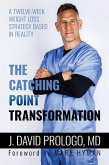From the New York Times bestselling author of The End of Overeating comes an illuminating understanding of body weight, including the role of the latest weight loss drugs, and the possibility of changing our health forever. The struggle is universal: we work hard to lose weight, only to find that it slowly creeps back. In America, body weight has become a pain point shrouded in self-recrimination and shame, not to mention bias from the medical community. For many, this battle not only takes a mental toll but also becomes a physical threat: three-quarters of American adults struggle with weight-related health conditions, including high blood pressure, heart disease, and diabetes. We know that diets don't work, and yet we also know that excess weight starves us of years and quality of life. Where do we go from here? In Diet, Drugs, and Dopamine, former FDA Commissioner Dr. David A. Kessler unpacks the mystery of weight in the most comprehensive work to date on this topic, giving readers the power to dramatically improve their health. Kessler, who has himself struggled with weight, suggests the new class of GLP-1 weight loss drugs have provided a breakthrough: they have radically altered our understanding of weight loss. They make lasting change possible, but they also have real disadvantages and must be considered as part of a comprehensive approach together with nutrition, behavior, and physical activity. Critical to this new perspective is the insight that weight-loss drugs act on the part of the brain that is responsible for cravings. In essence, the drugs tamp down the addictive circuits that overwhelm rational decision-making and quiet the "food noise" that distracts us. Identifying these mechanisms allows us to develop a strategy for effective long-term weight loss, and that begins with naming the elephant in the room: ultraformulated foods are addictive. Losing weight is a process of treating addiction. In this landmark book, one of the nation's leading public health officials breaks taboos around this fraught conversation, giving readers the tools to unplug the brain's addictive wiring and change their relationship with food. Dr. Kessler cautions that drugs, on their own, pose serious risks and are not a universal solution. But with this new understanding of the brain-body feedback loop comes new possibilities for our health and freedom from a lifelong struggle. Eye-opening, provocative, and rigorous, this book is a must-read for anyone who has ever struggled to maintain their weight-which is to say, everyone.
Hinweis: Dieser Artikel kann nur an eine deutsche Lieferadresse ausgeliefert werden.
Hinweis: Dieser Artikel kann nur an eine deutsche Lieferadresse ausgeliefert werden.








